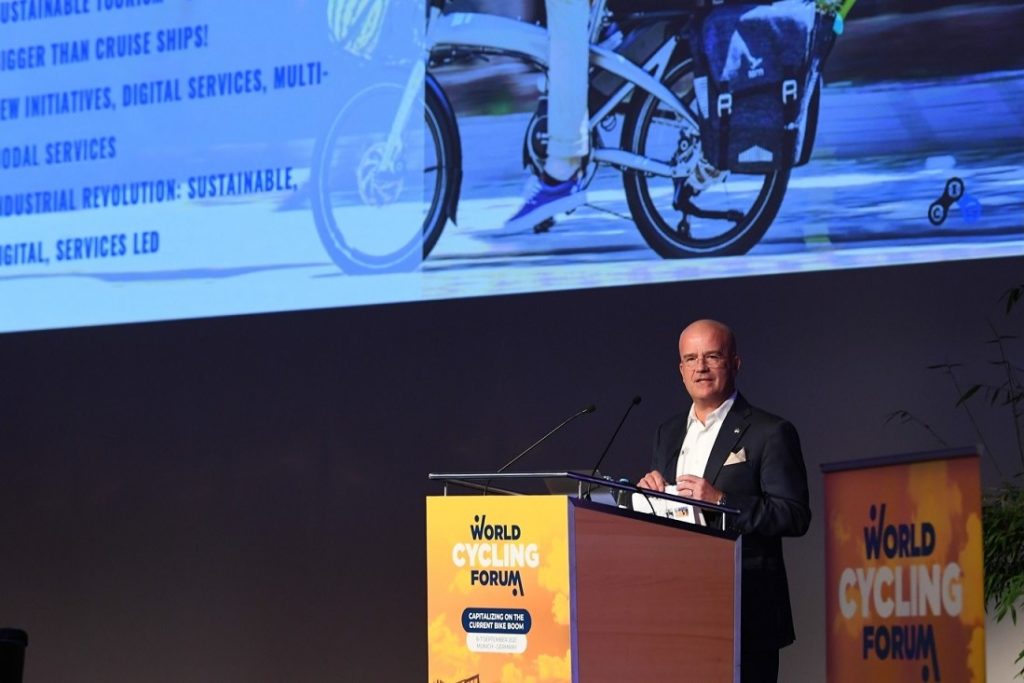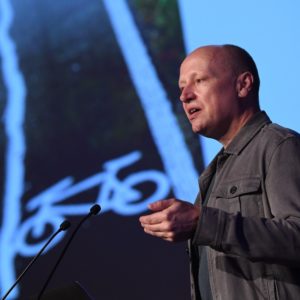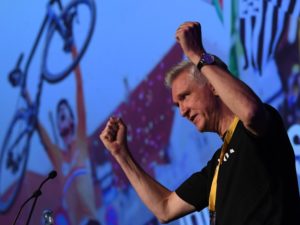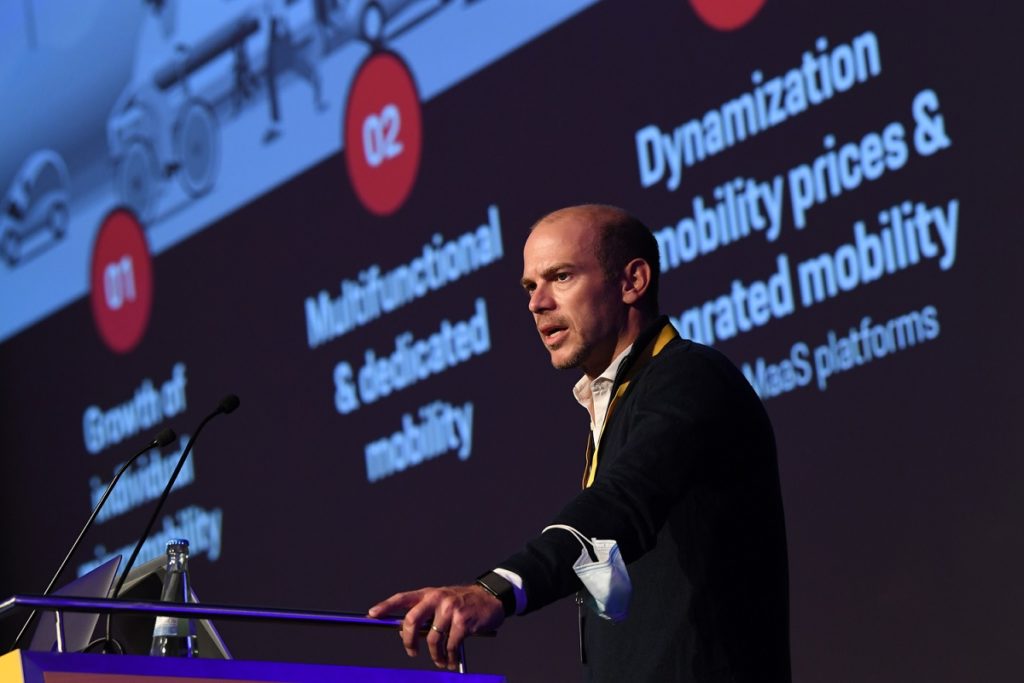Published on: www.bike-eu.com

MUNICH, Germany – “I never thought this combination of cars and bicycles in one show would happen,” said Thorsten Heckrath, owner of a leading German omni-channel retailer, Rose Bikes at the opening of the World Cycling Forum this year. His statement marks the disruptive developments the market faced since the start of the pandemic, including the first time ever that cars and bicycles blended on an international automotive show, the IAA Mobility in Munich.
Event organizer, WFSGI, made a step forward and took the World Cycling Forum to Munich for the premiere of this IAA Mobility which took place in the second week of September. The theme of the 2021 edition was “Capitalizing on the current bike boom”. A line-up of expert speakers addressed the business opportunities in the coming year which came to forefront during the pandemic, including:
- The development of the online bicycle marketplace.
- How to adapt to a developing retail environment?
- Changing consumer behaviour as a result of Covid-19 restrictions.
- Overview of governmental initiatives to aid and develop cycling.
- Where are new and potential markets for the bicycle industry?
Transformation to online

“Go to you customers and give room for your products to shine in a store,” said Rose owner Thorsten Heckrath.
“There are no limitations on internet,” Thorsten Heckrath continued. “They even sell cars online although they are much more complex than bicycles. You just need to find the right presentation and user experience.” While the retailer generates 80% of its sales online and 20% in its shop Rose Biketown in Bocholt, Germany, they have just decided to open another 10 locations on their home market and one in Switzerland together with some partners. “You have to go to you customers and give room for your products to shine in a store. Our shops are not a matter of size, it is all about how you connect to the users.”
While Rose owner Thorsten Heckrath puts a strong focus on emotional approach, Internetstores CBO Frank Aldorf emphasized the relevance of data in the transition to online sales. Today Internetstores is a leading digitized retail group for bike and outdoor operating 40 online shops in 15 countries. “Digital first is not about technology, all business aspects are included. For Internetstores data is king, while the heart rules. We see that too many companies stick to the old,” said Frank Aldorf. “It is the consumer who decides; see what happened during the pandemic. It is up to us to engage, not to sell more, but make connections and keep them on board. This provides up the opportunity to turn data into valuable information and business intelligence via our customer data platform. Business intelligence is shared with our brands which have seen a dramatic increase in performance.”
More bullish attitude
Philipp Rossner, CSO at Signa Sports United, owner of Internetstores as well as a range of online shops in various markets, took the audience one step further, by stating, “I had expected a more bullish attitude of the bicycle industry in today’s boom. You are holding some key features which are unique and will bring growth figures never seen before in this industry.”
You are holding some key features which are unique
Rossner referred to two elements. First of all connectivity. “The sports fashion industry can’t integrate chips in the clothing to measure the sports activity. In the bicycle industry it is widely available. That provides a unique feature, particularly for the sports market but also for daily-use bicycles. The second important growth aspect are the announced investments in infrastructure as part of the EU Green Deal. Don’t forget that the market for sports products has changed drastically over the past 2 decades. In the past people were participating in sports to compete and to win. Now more and more people want to be active as they want to live a healthier life and live longer. This requires a different market approach. The online market has changed drastically this year. In 2020 we sold some 300,000 bicycles and e-bikes. For this year we anticipate on 400,000 units. Also, IBDs see that online sales bring more than off-line only.”
Harley Davidson’s Serial 1
The announcement of Harley Davidson to enter the e-bike market a few years ago created some stirs in the bicycle industry. Was this a serious step by the American motorbike brand? Today Serial 1, the separate entity founded by Harley Davidson for its e-bike venture already partners with 130 dealers Europe-wide after an initial start in Germany announced Jason Huntsman, President of Serial 1 Company by Harley Davidson. “Breaking into the bicycle market is tough. We see e-bikes as an extension of our regular motor bike business into the e-mobility market. It is a big challenge for us to move into an adjacent industry.”
#BikeIsBest campaign
The cycling boom in the UK and London in particular during the pandemic was one of the most eye catching in Europe. The traffic disruption in the London City area was a much-discussed topic and resulted in the offspring of many new initiatives. One of those, the #BikeIsBest campaign, is funded by the industry and aims to communicate the benefits of cycling to the British public. Founder and CEO of Fusion Media, Adam Tranter, discussed his approach toward the industry and the private sector to achieve this goal. “London experienced the highest level of cycling since the sixties,” said Adam Tranter. “One of our activities was the creation of the ‘Cycling Marketing Board’ as we need to continue to attract new consumers to cycling and improve cycling’s image with the government and in the media on the long term to make the modality shift happen.”

“London experienced the highest level of cycling since the sixties,” said Adam Tranter, CEO of Fusion Media.
On a European level, Cycling Industries Europe (CIE) takes a similar approach. It was founded as a united company voice to grow cycling in Europe for the benefit of society. “At the moment we have 93 members of which 40% are into production and retail while 60% are service-related companies,” said Tony Grimaldi, CEO of Cycleurope AB and President of CIE. “On a European level we are working on easier access to bicycles and cycling in general.” Since its foundation in 2018 CIE published multiple studies to support its objectives.
Kristina Jasiunaite, MD of World Bicycle Relief Europe (WBR) spoke about the promotion of cycling and the accessibility of bicycles to a global level. Over the years WBR has provided close to 600,000 bicycles specially designed and locally assembled for people in need, especially in Sub-Saharan countries. “The bicycle improves a range of socio-economic circumstances and reduces poverty and hunger, it gives easier access to education and clean water,” explained Kristina Jasiunaite, “and directly contributes to achieving nine sustainability development goals of the UN development agenda.”
Hyper personalized customer experience
“For Canyon founder Roman Arnold, his position as a middleman and listening to his customers provide feedback to the bike manufacturers, was the main reason for him to start his own B2C company,” explained Simon Summerscales, Marketing and Brand manager at Canyon Bicycles. “Roman called it the ‘feedback loop’ and he developed Canyon not as a direct sales business only but also as a direct communication system.

“Online has one big advantage over off-line retailing,” said Simon Summerscales, Marketing and Brand manager at Canyon Bicycles.
Online has one big advantage over off-line retailing: it provides you the data of combinations of product searches. To anticipate on needs is a great example of data driven understanding of needs and AI & machine learning. In which sequence are which bikes most searched for? This information gives us the opportunity to give the customer a seamless experience along the journey. In each stage he or she needs to be connected which gives us the necessity to understand where the customer is.” The combination of the World Cycling Forum and the IAA Mobility triggered Simon Summerscales to state, “this is the ‘belly of the beast’: we are here to tell the automotive industry that bikes are a better solution.”
Future proof industry
“How do we make sure the bicycle industry is ready for emerging markets?” asked Raymond Gense, Director of Public Affairs Pon Holdings to the audience of the WCF-2021. “Nobody knows whether the projected sales of 30 million bicycles in Europe by 2030 is realistic. What I do know is that this industry needs more investments and support from Brussels. On a European level we have to compete with the automotive industry. The bicycle industry has one big competitive advantage: we create jobs while the car industry only fires people. And our industry is very innovative; e-bikes come with many technologies known from the car industry or will soon have it. The world of mobility is changing to multimodality, and it is inevitable that the bicycle will have an important position in that system. However, this new mobility calls for new metrics including demographics, infrastructure, user preferences, environmental impact, industry capabilities, employment and government policies.”
On the opening day of the WCF, Rose owner Thorsten Heckrath already stated that the industry has to discuss sustainable manufacturing as the usage of the product is green, but the production certainly not. Keynote speaker Erik Bronsvoort addressed this topic discussing his study on how to start a circular revolution. “The topic of sustainability and circular economy is only slowly being picked up by the bicycle industry,” said van Bronsvoort. “To transform from a linear, to a circular cycling economy, the entire industry needs to change. The publication of its sustainability report by Trek is only the start but it makes clear where the problems are.”
Bosch market entrance
In its analysis of the future mobility market Porsche Consulting set out four mega trends: growth of individual micromobility, multifunctional and dedicated mobility, dynamization of mobility prices and integrated mobility and finally, mobility systematically and in real time.

What made the Bosch market entrance so successful? Porsche Consulting made an analysis.
Porsche also analysed how Bosch was able to make a successful entrance in the e-bike market. “They started their e-bike business with a focus on mid-drives in 2009, but OEM-competitors began their serial production not before 2014,” said Nicolas Grimm, Senior Manager, Porsche Consulting. “Bosch main industry insider released their first components for electric bicycles in 2010, but did not succeed in the very beginning. Bosch derives know-how as experienced OEM from their cordless power tool battery technologies as well as the automotive sector. Today there are clear similarities between automotive and e-bike manufacturers, including innovations, supply chain and distribution. Today Bosch holds on to intermediate sales but in future they will go consumer direct. Nicolas Grimm pointed out these learnings: develop a good go-to market strategy, offer unique as well as customer-oriented services, but also strive for integrated supply chain excellence.”

